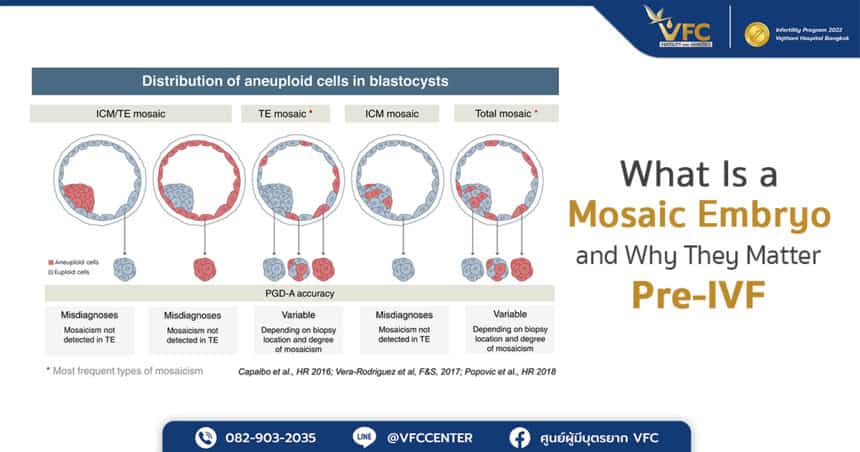
When you’re planning for pregnancy, primarily through IVF, there’s so much hope, but also a lot to consider. One term that might come up during the process is “mosaic embryo.” And while it may sound technical, understanding what it means before embryo transfer can be key to making informed choices and increasing your chances of success.
So, what is a mosaic embryo exactly? And why is it important to learn about it before you try to conceive? Let’s explore the reasons.
What Is a Mosaic Embryo?
A mosaic embryo is an embryo made up of a mix of genetically normal cells (called euploid) and abnormal cells (aneuploid). This condition is usually discovered through a technique called Preimplantation Genetic Testing for Aneuploidy (PGT-A), which is commonly used in IVF to screen embryos for chromosomal abnormalities before implantation.
In simpler terms, instead of all the embryo’s cells having the right number of chromosomes, some are missing or have extra ones. This mix is what makes the embryo “mosaic.” It’s not completely normal, but it’s not completely abnormal either.
While this might sound like a red flag, mosaic embryos can sometimes still result in healthy pregnancies. However, they do come with a few added considerations, which is why it’s helpful to understand this topic early on in your fertility planning.
How Do Mosaic Embryos Happen?
Mosaicism typically occurs shortly after fertilization, during the first few rounds of cell division. As the embryo’s cells start multiplying, some divide perfectly, while others might not. When an error happens during this process, specific cells can end up with the wrong number of chromosomes.
This genetic “mismatch” causes mosaicism. The impact of mosaicism can vary depending on which chromosomes are affected and how many abnormal cells are present. That’s why each mosaic embryo must be evaluated carefully before any decisions are made.
It’s important to understand that mosaicism is not caused by anything a person did or didn’t do. It’s a naturally occurring event that happens in early development, and modern IVF technology simply gives us the tools to identify it.
Why Understanding Mosaic Embryos Matters Before Pregnancy

If you’re planning to conceive through IVF, having as much knowledge as possible can give you more control over your journey. Understanding what is a mosaic embryo ahead of time means you won’t be caught off guard if your fertility team brings it up during genetic testing.
Here’s why it’s worth being informed before you’re even at the embryo transfer stage:
- Informed Decision-Making: Knowing what a mosaic embryo is helps you work with your fertility specialist to decide which embryos have the best chance of leading to a healthy pregnancy.
- Genetic Screening: PGT-A can identify mosaic embryos before transfer, giving you critical insights about each embryo’s viability.
- Planning Ahead: If a mosaic embryo is identified, you may need genetic counseling to understand the risks and the next steps. This early planning can help you save time, money, and emotional strain later on.
- Personalized Approach: Depending on their circumstances, some people may choose to transfer a mosaic embryo, while others may opt to wait for an euploid one. Knowing your options in advance allows you to make decisions that align with your goals and comfort level.
Ultimately, understanding mosaicism is not about adding stress; it’s about empowering yourself with knowledge that supports smarter, safer fertility choices.
Do Mosaic Embryos Have Any Symptoms?
Mosaic embryos themselves do not cause symptoms in the person carrying the embryo or undergoing IVF. Mosaicism is a genetic condition within the embryo, not something that produces physical symptoms in the body before or during pregnancy.
Here’s what you should know:
The presence of Mosaicism can be identified via Preimplantation Genetic Testing for Aneuploidy (PGT-A):
- It’s discovered during Preimplantation Genetic Testing for Aneuploidy (PGT-A), which screens embryos created via IVF before they are implanted.
- This test examines a small sample of cells from the embryo’s outer layer (the trophectoderm) to assess whether the chromosomal content is normal (euploid), abnormal (aneuploid), or a mixture of both (mosaic). However, it is essential to note that the result reflects only the sampled cells and may not always represent the entire embryo.
No physical signs or symptoms in the individual:
- You won’t experience pain, hormonal shifts, or any visible signs due to having a mosaic embryo.
- Mosaicism doesn’t affect your menstrual cycle or fertility symptoms either.
Potential outcomes if transferred:
While mosaic embryos can sometimes lead to healthy pregnancies, potential issues after implantation (if any) could include:
- A higher risk of miscarriage (depending on the type and extent of mosaicism)
- In rare cases, developmental or chromosomal abnormalities in the fetus
However, many transfers of mosaic embryos result in healthy babies, especially when guided by fertility specialists.
How V Fertility Center Helps You Prepare
At V Fertility Center (VFC), the goal is to make your fertility journey as informed and supportive as possible from the very beginning. Whether you’re just starting to explore IVF or you’re ready to move forward with treatment, VFC offers expert guidance tailored to your unique path.
Our clinic provides comprehensive fertility evaluations, including advanced genetic screening options like PGT-A. If a mosaic embryo is identified during testing, our experienced team will walk you through what it means and what your options are.
You’ll also have access to physicians who can help explain complex results in simple, compassionate language. From the start, the team at VFC works with you to create a personalized fertility strategy, one that reflects your health, your hopes, and your future plans.
With cutting-edge technology, a dedicated care team, and a focus on transparency, VFC is here to help you take the next step with confidence.
Consult With VFC Today
Planning a pregnancy can be one of the most exciting and sometimes overwhelming periods of your life. But with the right support and education, you can navigate it with clarity and calm. Knowing what is a mosaic embryo before beginning your fertility treatment is just one example of how being prepared can make all the difference.
Thinking about starting a family? Visit VFC Center, a leading fertility center in Thailand, for expert fertility advice, genetic screening, and personalized support on your path to parenthood.

The team of specialists in obstetrics and gynecology and reproductive medicine





No Comments
Sorry, the comment form is closed at this time.